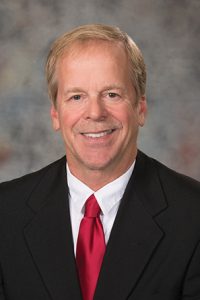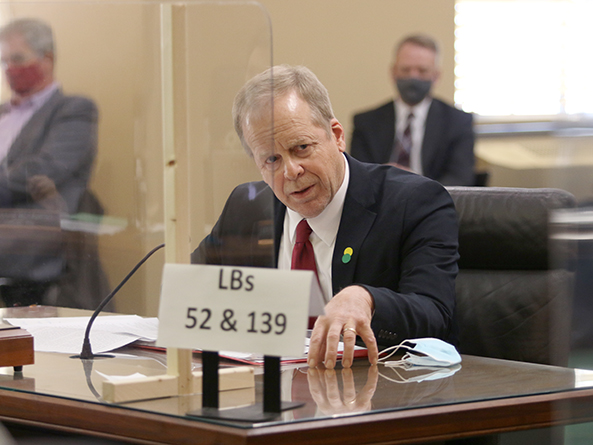COVID-19 liability protections considered
The Judiciary Committee heard testimony Feb. 18 on a proposal meant to discourage frivolous lawsuits related to the ongoing coronavirus pandemic.

LB139, sponsored by Albion Sen. Tom Briese, would provide civil liability protections for a broad range of individuals and organizations.
As businesses, educational institutions and health care providers struggle to recover from the impact of the pandemic, Briese said, they are faced with the threat of unwarranted, needless lawsuits.
“I believe it’s incumbent upon us as policymakers to do everything we can to facilitate our state’s recovery from this pandemic,” he said. “Implementing the protections found in LB139 is one very substantial step that we can take to help this recovery.”
Protected groups under the bill would include medical and other health care providers, first responders, medical facilities, schools, restaurants, retail stores, churches, senior care facilities and individual citizens — as long as they follow public health guidance.
The bill would prevent a civil action arising from exposure or potential exposure to COVID-19 unless an individual could prove by clear and convincing evidence that an inpatient hospitalization or death was caused by the defendant’s gross negligence or willful misconduct.
LB139 also would provide protected individuals and organizations with “safe harbor” protections from paying civil damages as long as they acted in accordance with federal or state law, regulation or order or public health guidance related to COVID-19.
Under the bill, a civil action arising out of COVID-19 exposure must be brought within two years after the date of exposure. The liability protections established in LB139 would expire on Dec. 31, 2022, or one year after the COVID-19 state of emergency ends, whichever is later.
Mark Schorr, speaking on behalf of the Nebraska Chamber of Commerce and Industry, testified in support of the bill. He said the proposal would provide a middle-ground approach that ensures reasonable protections.
“Here in Nebraska, as in other states, we are easing restrictions on social and economic activities,” he said. “However, as we continue to reopen the state, there is continued fear and legitimate concerns over facing the issue of COVID-19 claims and liability from not only individuals who are opening their businesses again, but also organizations, religious organizations, their patrons and individuals.”
Also supporting the bill was Emily Bottorf, representing the Nebraska Defense Counsel Association. The ease with which the coronavirus spreads can make it nearly impossible to take all necessary steps to prevent exposure, she said.
“Our current body of law … is simply not a good fit for these lawsuits,” Bottorf said. “It would leave individuals, businesses and health care providers vulnerable to very expensive litigation.”
Andy Hale, representing the Nebraska Hospital Association, spoke in support of LB139. He said exposing health care workers to potential liability would ignore that many had to work through the pandemic despite a lack of personal protective equipment, resources and adequate staffing.
“We need to provide our hospitals and the over 44,000 employees the peace of mind that comes with the protection from civil liability,” Hale said. “They need a sense of calm so they can continue to provide great quality care without the worry of being sued.”
Opposing the bill was Jonathan Urbom, representing the Nebraska Association of Trial Attorneys. He said an individual would have to cause injury knowingly, intentionally or with complete reckless disregard in order to meet the bill’s burden of proof.
“Nebraska does not have a COVID-19 litigation problem that requires immunity provisions or an increased higher standard,” Urbom said.
Todd Stubbendick, speaking on behalf of AARP Nebraska, also testified against LB139. Many senior care facilities have done well during the pandemic, he said, but some have not.
“While there may be circumstances beyond a facility’s control for which they should not be held responsible, pursuing a nursing home neglect or abuse case in court is already a [difficult] thing to do,” Stubbendick said. “No family who has lost a loved one due to neglect or abuse pursues this course of action lightly.”
The committee took no immediate action on LB139.


